QuestionQUESTION: Hi there, my cat is allergic to plastic. She developed an allergy to her plastic water bowl and her lips swole up. Since then, we have gotten her ceramic bowls for her food and water.
However, we wanted to get her a water fountain - as she loves drinking from the faucet and I wanted her to have the fresher water, since my wife and I tend to be at work for most of the day.
The problem is that we cannot find a non-plastic water fountain. They appear to all be plastic. I'm not sure where the plastic allergy comes from (how it affects the cat), but I have heard people say that their cats do not have problems with the fountains, when they do have problems with plastic bowls. So, my question is - is it safe for a cat with plastic allergies to drink from a plastic fountain?
ANSWER: Daniel,
I have two questions that may help to shed some light on things for both of us. I want to be sure that I give you the appropriate advice for your specific situation and from what I know the information you've provided could suggest a severe, potentially life threatening allergy to plastic or a serious case of chin acne.
- What sort of reaction does your cat have to plastic?
If your cat's reaction involves difficulty breathing, significant swelling in her mouth, airway or face I wouldn't recommend taking any chances with plastic dishes of any kind. These severe reactions can be treated by a vet using antihistamines or in severe cases epinepherine which is a form of adrenaline, which can help maintain breathing and heart function to reduce the likelihood that a life threatening reaction will be fatal.
If your cat simply gets angry looking pimples on her chin then there may be some wiggle room to work with. Sometimes cats develop chin acne when they eat or drink from plastic dishes, this happens because plastic is porous and bacteria can build up in tiny scratches so that when your cat's chin comes into contact with her food/water bowls she breaks out. Chin acne can become badly infected if not watched carefully. The easiest and best thing for cat and caregiver at that point is to switch to glass or ceramic dishes.
- Have you considered alternatives to the commercially produced fountains?
The mechanism that makes the commercial fountains work is actually the same as the one that makes an aquarium filter function. If you're somewhat handy you could buy a small fish filter from your local pet supply or aquatic specialty store, take it apart and put something together where your cat wouldn't come into direct contact with any plastic parts.
I wish that I had some simple answer in this case, but if your cat is truly allergic to plastic it's safest not to gamble with her life. There would certainly be demand from pet parents if you managed to design a glass or ceramic fountain with a filter like the plastic models. If you have any further questions, concerns or you'd like me to clarify anything in this answer, please feel free to contact me again.
---------- FOLLOW-UP ----------
QUESTION: Her front lips swell up, making her look like a great big rat. The vet actually called it something like Rodentitis. I tried looking that up and couldn't find anything on it..though I want to remember her saying that that particular reaction was somewhat rare.
So, is it the cat's contact with the plastic that causes the reaction, or the water touching the plastic? I've seen fountains that pour or arc the water, so that it doesn't touch the plastic. However, I wasn't sure if that would help, since the water would still be stored in and circulating through the plastic.
AnswerDaniel,
I want to be sure that you understand that I'm not a veterinarian, this means that I can't offer medical opinions, diagnose medical conditions, recommend treatment protocols or offer a prognosis about any medical condition. That being said I've taken the liberty of doing some research and based on the information you've provided I wonder if your kitty's reaction has taken the form of an Eosinophilic Granuloma which is commonly referred to as a rodent ulcer. I've spent a few hours researching this condition and based on the wide variety of sites that I've checked out there is some agreement within the veterinary community that these ulcers can be related to allergic reactions to a variety of substances or other autoimmune conditions. I've taken the liberty of including some of the more reliable sites written by veterinarians in this answer so that you can further research this condition.
Here are a few sites with articles written by veterinarians about this condition:
- http://www.veterinarypartner.com/Content.plx?P=A&A=656&S=4&SourceID=42
- http://drbarchas.com/rodent_ulcers
- http://www.alternativevet.org/cat-diseases.htm#rodent
- http://www.naturalpaws.com.au/rodent-ulcers-usefulinfo-75-false.html, holistic remedies for this condition.
I've also taken the liberty of sending the following websites your way, I'd like to warn you that they contain graphic photos of rodent ulcers in cats. These photos may remind you of your cat's allergic reaction, but I can't provide you with a diagnosis, I'm simply working on the information you've provided and what my past experience has shown may be happening in this situation.
- http://www.thepetcenter.com/gen/eulcer.html
- http://littlecrittersvet.com/PhotoGallery/Veterinary-Medicine-Photos/DSC00108_Me
- http://littlecrittersvet.com/PhotoGallery/Veterinary-Medicine-Photos/DSC00896_Me
- http://littlecrittersvet.com/PhotoGallery/Veterinary-Medicine-Photos/DSCN1673_Me
I really wish that I could offer you the answers you're looking for, but I'm not a veterinarian which means that I'm really not qualified to give opinions related to any medical conditions, especially those as complex as allergies and other issues related the immune system. Based on the research there are many different opinions about what causes allergic or autoimmune conditions and what the best treatment approach is to ensure the long term health and safety of your kitty. My veterinarian is an absolutely fantastic holistic practitioner, she uses conventional medical treatments and homeopathy in her practice. In my experience our family vet's treatment plans are individualized depending on the situation, sometimes she'll use homeopathic remedies, other times she'll use conventional medicine and sometimes she'll use a combination of homeopathy and Western medicine to treat conditions based on what's appropriate in any given situation.
Allergic reactions are complex, determining whether your cat's reaction is specifically related to the use of plastic food/water bowls or if she's so sensitive that her reaction is caused by her food/water coming into contact with plastic is outside the scope of my expertise and in my opinion it's something that should be discussed with a veterinarian. If you're not entirely comfortable asking your vet for a consultation to discuss your kitty's allergies then my recommendation would be to check out the Ask a Vet portion of this site and present your situation to one of the veterinarians. If you're interested in a holistic approach I'd recommend that you consider contacting Dr. Christine Chambreau in the Ask a Vet portion of the allexperts site. To the best of my knowledge this vet does phone and internet consultations throughout the US, fees should be discussed with the vet.
If your kitty has a rodent ulcer it's actually quite common, if you want to consider using homeopathy or other disciplines to treat this condition I'd strongly recommend that you consult with a holistic vet who uses holistic treatments like homeopathy or herbal medicine to treat medical conditions whenever appropriate. From what I understand the causes of rodent ulcers are often linked to the immune system. Allergies, whether related to food, environmental factors or household chemicals are frequently discussed in articles about rodent ulcers, but this condition is somewhat complicated and there are many different views that veterinarians worldwide express on this subject as you'll see on the websites that I've sent your way. When it comes to treating rodent ulcers many websites recommend looking more closely at potential causes and eliminating the usual culprits related to allergic reactions including a highly processed commercially prepared diet, the use of plastic food/water dishes, household cleaning agents and chemicals and other environmental factors. Some sites recommend using an antihistamine to see if those medications will reduce or eliminate a rodent ulcer without the use of steroids.
I really do think it would be in the best interests of you and your cat if you booked a consultation with your vet to discuss your questions about your kitty's allergies. Such a consultation may help you to gain a better understanding of the cat's diagnosis, treatment options, prognosis and recommendations your vet may have related to this kitty's overall health and wellbeing. I also believe that consulting with your vet and asking for his/her opinions about pet fountains just might provide you with valuable information as well as the veterinarian's opinion when it comes to whether it's safe for your kitty to even try a cat water fountain. If you aren't comfortable asking questions of your vet about your cat's condition then my recommendation would be to start looking for another veterinarian - I believe it's important to be completely comfortable with your veterinarian so that you can discuss medical concerns, treatment options and recommendations, your cat's life may one day depend on being able to communicate comfortably with your vet.
We use a cat fountain in our household and two of our resident cats will develop painful looking acne on their chins if they eat from plastic bowls. We were initially concerned about the possibility that the cats wouldn't be able to use the plastic fountain, but so far we've been lucky and everyone's okay with the plastic fountain. Even before we started using a pet fountain our cats drank either filtered or bottled water (they don't like the taste of the municipal water supply, neither do we though!#. Our fountain filters the water and keeps it circulating all the time - this means that our cats get water that's filtered twice and there's the added benefit of the water being cooler and cleaner since it's circulating constantly. We use the Drinkwell pet fountain equipped with the optional extra capacity reservoir and our biggest complaint is that it's difficult to clean all of the individual nooks and crannies even after we purchased a set of brushes the company sells specifically to clean their fountain. We've had to resort to using Q-tips to get into tiny spaces and clean gunk out of them, we clean our fountain every week and replace the filters at the same time - in a single cat household you shouldn't have to clean the fountain or replace the filters that frequently provided that your cat doesn't use the fountain to wash her paws after she exits the litter box #our oldest resident cat does this from time to time forcing us to clean the fountain and replace the filter more frequently, sometimes as often as every second day). I really wish that I could offer more information to help you make the right decision about using a pet fountain, especially since your kitty really enjoys drinking directly from a dripping tap, unfortunately your situation includes complex medical issues that I'm not qualified to address. Hopefully some of the information that I've provided in this answer will help you to learn more about this condition. If you have any further questions, concerns or you'd like me to clarify anything in this answer, please feel free to contact me again. I'd be more than happy to help you out to the best of my ability.

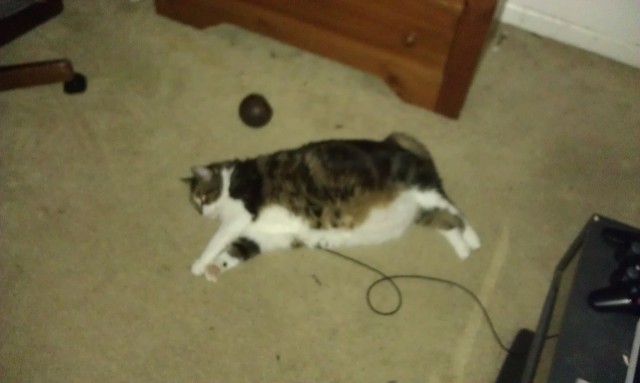 what type of cat is mine?
Question
zella
Ok this cat is very big one of bi
what type of cat is mine?
Question
zella
Ok this cat is very big one of bi
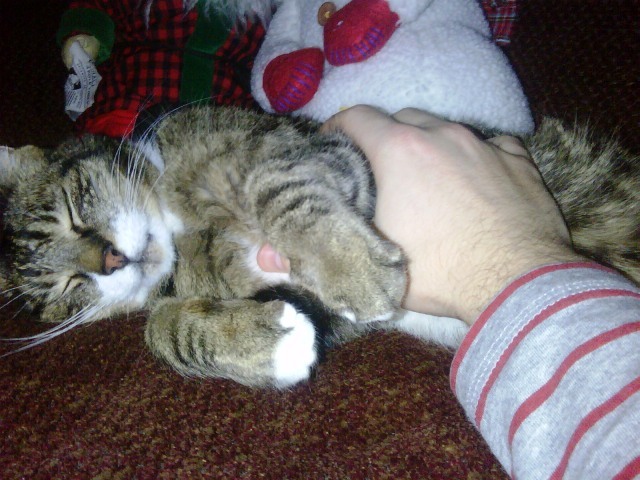 brother and sister loss of cat (16 years)
Question
Jesse on Xmas 2009, Re
kate -
my name
brother and sister loss of cat (16 years)
Question
Jesse on Xmas 2009, Re
kate -
my name
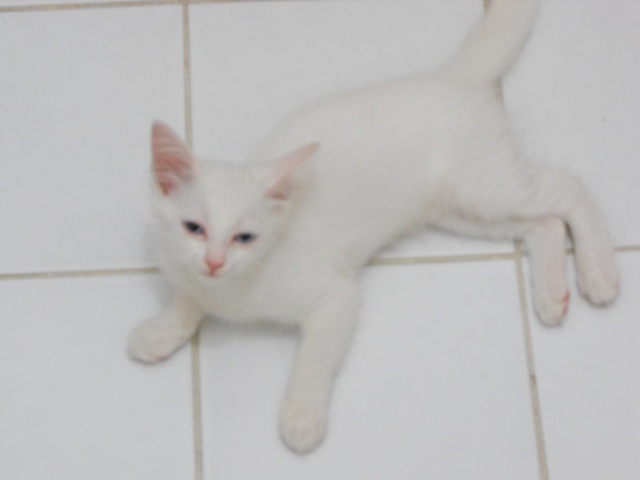 Kitten breed
Question
Minnoo
Dear Sir,
I brought home a female kitte
Kitten breed
Question
Minnoo
Dear Sir,
I brought home a female kitte
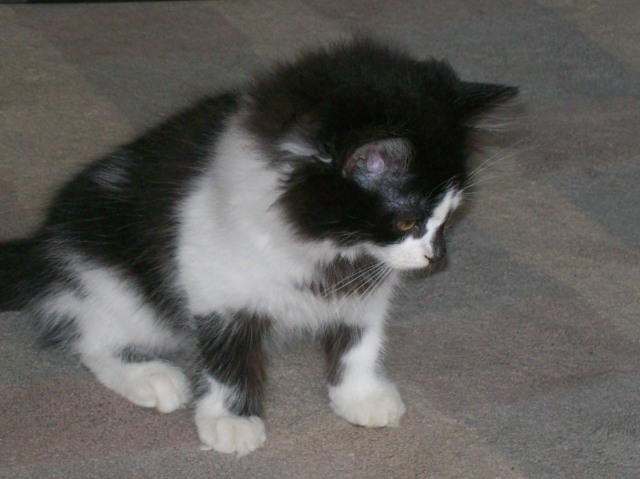 handling my 9 week ferel kitten
QuestionMillie
QUESTION: Hi. My lovely 9 week ki
handling my 9 week ferel kitten
QuestionMillie
QUESTION: Hi. My lovely 9 week ki
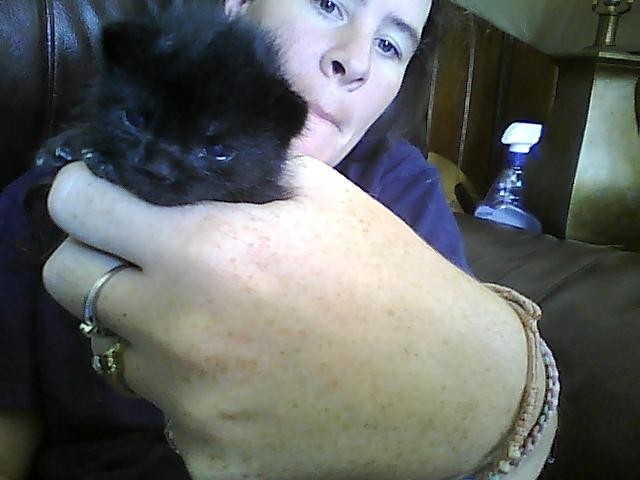 teething
Question
wally
i have a orphened kitten i have b
teething
Question
wally
i have a orphened kitten i have b